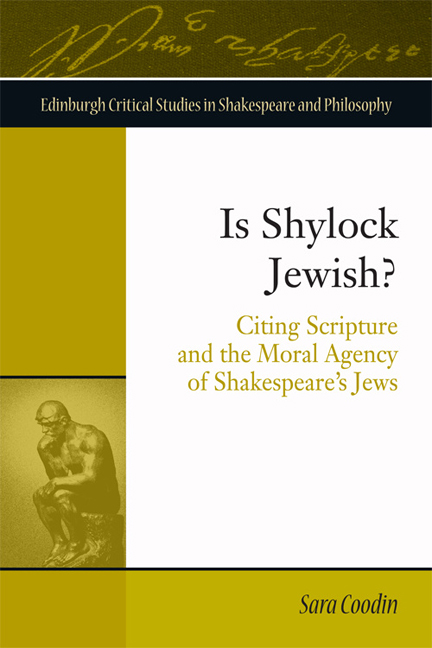4 - Rebellious Daughters on the Yiddish Stage
Published online by Cambridge University Press: 22 December 2017
Summary
The phrase fartaytsht und farbesert! ‘ translated and improved!’ that is said to appear in the preface to an early Yiddish translation of King Lear has long formed part of the lore surrounding Yiddish-language adaptations of Shakespeare. The expression is probably apocryphal – there is no record of its existence in any printed copy of Shakespeare's plays in Yiddish; and yet, fartaytsht und farbesert has nevertheless become endemic to the cultural understanding of Yiddish Shakespeare translations among Yiddish-speaking Jews, and something of an inside joke whose self-promotional claim to not only translate but also ameliorate Shakespeare's plays Joel Berkowitz aptly describes as ‘an inimitable combination of nineteenth-century American puffery and Jewish ethnic pride’.
For all of its naivety uncannily shored up with chutzpah, its status as folklore rather than historical fact, fartaytsht und farbesert manages to distil a vital essence of the spirit of Yiddish adaptations of Shakespeare and the writers who undertook them in ways that confirm but also transcend familiar stereotypes. The spirit of innovation that prompts such adaptations strikes a noteworthy contrast with the English colloquial expression ‘new and improved’. Rather than emphasising what is new, ‘translated and improved’ calls attention to what is old by emphasising the act of bringing authoritative, not new, texts to the attention of present-day audiences. Although many Jewish writers have Shakespeare's cultural capital in mind when they translate his plays into Yiddish in the hopes of ennobling Yiddish as a language, Yiddish adaptations of Merchant in fact routinely chart a return to an even more authoritative set of texts – Hebrew biblical stories, which writers rely on to render Shakespeare's play more relevant and meaningful for contemporary Jewish audiences. It is the return to these stories that forms the subject of the present chapter.
In the pages that follow I discuss two adaptations that self-consciously borrow from biblical stories: Meir Jacob Freid's 1897–8 short prose adaptation, Der koyfmann fun Venedig and Maurice Schwartz's 1947 hit theatrical adaptation, Shayloks tokhter.
- Type
- Chapter
- Information
- Is Shylock Jewish?Citing Scripture and the Moral Agency of Shakespeare's Jews, pp. 197 - 244Publisher: Edinburgh University PressPrint publication year: 2017

